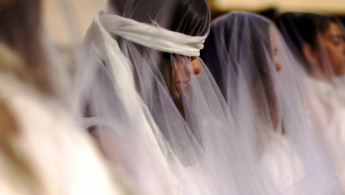HRW urges Lebanon to pass bill ending child marriage
Human Rights Watch called on the Lebanese parliament to take additional steps to protect the rights of women in the country, in a statement released on Wednesday.
The New York-based watchdog said tackling child marriage is a strategic way to advance women's rights and empower them.
"Legislation prohibiting child marriage is long overdue for Lebanon," said Lama Fakih, deputy Middle East director at Human Rights Watch.
"Setting 18 as the national minimum age for marriage will go a long way toward protecting children from the horrors of early marriage."
A draft law to set the marriage at 18 was introduced in Lebanon last month but awaits approval.
Once passed, it will punish anyone contributing to or facilitating the marriage of a minor with fines equal to 10 times the minimum wage and prison sentences ranging from six months to two years.
"Setting 18 as the minimum age of marriage is a common-sense measure that will have a real impact on the lives of girls in Lebanon," Fakih said.
"Parliament should pass the law without delay."
The bill was prepared by the Lebanese Women's Democratic Gathering and introduced by Elie Keirouz, a member of parliament.
Earlier this year, the Lebanese parliament voted to scrap a controversial law - Article 522 - that allowed rapists to marry their victims, as a way of escaping punishment.
The proposal to scrap the article was introduced in 2016 but only approved in February 2017.
A parliamentary committee also proposed raising the penalty for assaults against girls aged under 15 to a maximum of seven years.
In December, the New York-based Human Rights Watch urged Lebanon to repeal Article 522, saying it "allows for a second assault on a rape survivor's rights".
"Protecting honour should be about ensuring that attackers are punished and promoting social attitudes that support survivors of sexual violence instead of stigmatising them," the rights watchdog said.
Lebanon largely leaves so-called personal status issues to the discretion of religious authorities of the country's 18 recognised sects.


![President Pezeshkian has denounced Israel's attacks on Lebanon [Getty]](/sites/default/files/styles/image_684x385/public/2173482924.jpeg?h=a5f2f23a&itok=q3evVtko)



 Follow the Middle East's top stories in English at The New Arab on Google News
Follow the Middle East's top stories in English at The New Arab on Google News


